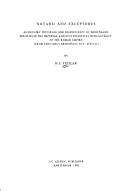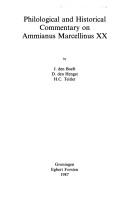| Listing 1 - 6 of 6 |
Sort by
|

ISBN: 907026577X 9789070265779 9004544526 Year: 1985 Volume: v. 1 Publisher: Amsterdam: Gieben,
Abstract | Keywords | Export | Availability | Bookmark
 Loading...
Loading...Choose an application
- Reference Manager
- EndNote
- RefWorks (Direct export to RefWorks)
Exceptores --- Notarii (Roman officials) --- Notarii (Fonctionnaires romains) --- Rome --- Politics and government --- Politique et gouvernement --- 003.27 --- 930.272 =71 --- #GOSA:II.P.AU.1 --- #GOSA:XI.Oud.M --- Stenographers --- Stenografische schriftsoorten --- Paleografie--Latijn --- -003.27 --- 930.272 =71 Paleografie--Latijn --- 003.27 Stenografische schriftsoorten --- -Notarii (Roman officials) --- -Exceptores --- Exceptores. --- Notarii (Roman officials). --- Rome - Politics and government - 30 BC-476 AD
Book
ISBN: 9780190626501 019062650X 9780190626518 0190626518 9780190626525 9780190626532 0190626526 0190626534 Year: 2017 Publisher: New York: Oxford university press,
Abstract | Keywords | Export | Availability | Bookmark
 Loading...
Loading...Choose an application
- Reference Manager
- EndNote
- RefWorks (Direct export to RefWorks)
Flavius Claudius Julianus was the last pagan to sit on the Roman imperial throne (361-363). Born in Constantinople in 331 or 332, Julian was raised as a Christian, but apostatized, and during his short reign tried to revive paganism, which, after the conversion to Christianity of his uncle Constantine the Great early in the fourth century, began losing ground at an accelerating pace. Having become an orphan when he was still very young, Julian was taken care of by his cousin Constantius II, one of Constantine's sons, who permitted him to study rhetoric and philosophy and even made him co-emperor in 355. But the relations between Julian and Constantius were strained from the beginning, and it was only Constantius' sudden death in 361 which prevented an impending civil war. As sole emperor, Julian restored the worship of the traditional gods. He opened pagan temples again, reintroduced animal sacrifices, and propagated paganism through both the spoken and the written word. In his treatise Against the Galilaeans he sharply criticised the religion of the followers of Jesus whom he disparagingly called 'Galilaeans'. He put his words into action, and issued laws which were displeasing to Christians—the most notorious being his School Edict. This provoked the anger of the Christians, who reacted fiercely, and accused Julian of being a persecutor like his predecessors Nero, Decius, and Diocletian. Violent conflicts between pagans and Christians made themselves felt all over the empire. It is disputed whether or not Julian himself was behind such outbursts. Accusations against the Apostate continued to be uttered even after the emperor's early death. In this book, the feasibility of such charges is examined.
Church and state. --- Church history --- Paganism. --- Religion. --- Church and state --- Paganism --- Eglise et Etat --- Eglise --- Paganisme --- Primitive and early church. --- Histoire --- Julian, --- Rome (Empire) --- BIOGRAPHY & AUTOBIOGRAPHY / Historical. --- HISTORY / Ancient / Rome. --- 30-600. --- Rome (Empire). --- Biography & autobiography / historical. --- History / ancient / rome. --- Religion --- Church and state - Rome --- Church history - Primitive and early church, ca. 30-600 --- Paganism - Rome --- Julien l'Apostat --- Julian, - Emperor of Rome, - 331-363 - Religion --- Julian, - Emperor of Rome, - 331-363
Book
Abstract | Keywords | Export | Availability | Bookmark
 Loading...
Loading...Choose an application
- Reference Manager
- EndNote
- RefWorks (Direct export to RefWorks)
Book
ISBN: 9789025364366 Year: 2009 Publisher: Amsterdam Athenaeum-Polak & Van Gennep
Abstract | Keywords | Export | Availability | Bookmark
 Loading...
Loading...Choose an application
- Reference Manager
- EndNote
- RefWorks (Direct export to RefWorks)

ISBN: 9069800128 9060880382 9069800861 9069801205 9004123350 9004142142 9789004162129 9789004180376 9789004215993 9004162127 9004180370 9789069800127 9789069800868 9789004142145 9781429452632 1429452633 9781433703928 1433703920 1280867507 9786610867509 Year: 1987 Publisher: Groningen: Forsten,
Abstract | Keywords | Export | Availability | Bookmark
 Loading...
Loading...Choose an application
- Reference Manager
- EndNote
- RefWorks (Direct export to RefWorks)
This is a commentary on Book XXV of the Res Gestae by the fourth century historian Ammianus Marcellinus. The commentary discusses philological, literary, linguistic and historical problems in the Latin text.
871 AMMIANUS MARCELLINUS
---
Latijnse literatuur--AMMIANUS MARCELLINUS
---
871 AMMIANUS MARCELLINUS Latijnse literatuur--AMMIANUS MARCELLINUS
---
Ammianus Marcellinus
---
Ammianus Marcellinus.
---
Valentinian
---
Valens,
---
Res gestae (Ammianus Marcellinus).
---
Ammianus,
---
Ammien Marcellin.
---
Valens
---
Valentinian,
---
Valentinien
---
Ammianus
Book
ISBN: 9063035594 Year: 1994 Volume: *97 Publisher: Leuven Baarn Kritak Ambo
Abstract | Keywords | Export | Availability | Bookmark
 Loading...
Loading...Choose an application
- Reference Manager
- EndNote
- RefWorks (Direct export to RefWorks)
Classical Latin literature --- Histoire et culture romaines --- Politiek --- Politique --- Romeinse geschiedenis en cultuur
| Listing 1 - 6 of 6 |
Sort by
|

 Search
Search Feedback
Feedback About UniCat
About UniCat  Help
Help News
News